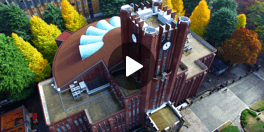東京大学大学院 情報学環 学環長・学際情報学府 学府長
目黒公郎(めぐろ・きみろう)
The Dean of The University of Tokyo III/GSII
III: Interfaculty Initiative in Information Studies
GSII: Graduate School of Interdisciplinary Information Studies
Kimiro MEGURO
東京大学大学院情報学環・学際情報学府は、2000年の創立以来、情報に関する総合的で先端的な研究教育組織として着実に発展してきました。大学院情報学環(学環)が研究組織、大学院学際情報学府(学府)が教育組織です。学環・学府は時代に伴う情報通信技術やメディア環境の社会的変容を受けて、研究領域の拡充や教育体制の整備も図ってきました。情報学環の「環」は「リング」という意味です。現在の社会的課題の多くが従来型の個別のディシプリンでは解決できない中で、人文社会系・工学系・アート/デザイン系・生物統計など、様々な専門分野の第一線の教員による連携研究と優秀な学生たちへの教育によって、現在、そして将来的な課題解決を目指す組織です。現在では、「情報と社会基盤・戦略」、「情報と倫理・文化」、「情報とアート・デザイン」、「情報と防災・コミュニケーション」に関わる研究的な知見が集積され、それぞれの領域を形成できるまでに成長しました。また、2000年の設立から今日までの間に、学府からは1,800人を超える修士課程修了者と220人を超える博士取得者が出ています。1949年に創設された教育部の修了生は900人以上です。これらの修了生が、学術のみならず、社会の様々な分野で活躍しています。
ところで、2019年に始まった新型コロナウィルス感染症(COVID-19)は、地球規模で猛威を振るい、世界中の人々の生活様式や環境に大きな変化をもたらしました。このCOVID-19への対応の中でも、情報通信技術やメディア環境は大きく変容し、学環・学府の持つ社会的意義はますます高まっています。生成AIを含むAIを取り巻く課題の研究なども、全学的に見て学環・学府が最も分野横断的に取り組めるものでしょう。情報理工的な分野は当然重要ですが、一方で法制度面での検討も不可欠です。AIが生み出す様々な成果の効果的な活用法、人間に及ぼす影響の評価と対処法などについては、学環・学府の中で分野を超えた研究と教育が可能です。理工系、人文社会系、芸術系、生物統計などを融合して社会問題に解決策を示すことが、現在の学環・学府のあるべき姿の一つだと思います。その際には、上で説明した学府の修了生とのコラボレーションをより充実させることも重要です。
学環の特色のひとつに、他の研究科・研究所等の教員が、数年の期間をもって情報学環に身分を異動する流動教員の制度があります。私は流動教員の皆さんが学環・学府に来られたからこそ出会える面白い教員や学生と協力して、元部局ではできなかった研究や教育が実施できる環境作りに努めたいと思います。これによって学環・学府も成果をあげることができるし、元部局にとっても流動教員が新しい人的ネットワークや成果を持って帰ることになり、双方にとってウィンウィンの状況が実現します。このような環境で学ぶ学府の学生の皆さんには、自身の向上や成長のみならず、先生や周りの学生に刺激を与えて、これからの学環・学府を、ひいては東京大学や社会を大きく変えていくんだという意識を持っていただきたい。
学環・学府は2025年には設立25周年を迎えますが、設立以来の時間経過の中で、さまざまな課題も見えてきています。例えば、構成メンバーのリソースにフィットした組織化ができているか? 日常的なトラブルシューティングに追われ、長期的なビジョンを議論する時間が取れていないのではないか? 等々です。設立25周年のタイミングは、局所最適解を狙いすぎで全体最適解から逸脱するような、構造的な問題が起きていないかを点検する時期であり、点検の結果、問題があれば、これを変革する必要があると思います。
藤井輝夫総長がUTokyo Compassで掲げられている全学的な目標を踏まえ、学環・学府が期待される活動を実施するために不可欠なことは、学環・学府のメンバーが学内外の様々な人々と積極的に交流することです。そのためには、まずは学環・学府の教員と学生、そして事務の皆さんが良好な関係で研究や教育を推進できる環境整備が大切です。私はこの交流活動を積極的に支援したいと考えていますが、これを実現するには、学環・学府はもう少し財政的な余裕が必要です。文部科学省や本部からの財政的な支援も減りつつある中では、積極的に競争的資金を取りにいったり、社会と協働する活動を通じたりして研究資金を得る努力も必要です。流動の制度をはじめ、学環・学府は学内の他部局の皆様の協力があって初めて成立する組織ですし、さらに発展するには学外の様々な皆さまからのご支援が不可欠です。学環・学府を取りまとめる立場として、精一杯努力しますので、皆様のご理解とご支援を切にお願いします。
2024年4月
大学院情報学環・学際情報学府
情報学環長・学際情報学府長
目黒 公郎
The Interfaculty Initiative in Information Studies (III) and the Graduate School of Interdisciplinary Information Studies (GSII) were established at the University of Tokyo in 2000. Since their establishment, they have each undergone steady development as comprehensive and cutting-edge organizations devoted respectively to research and education on information. The research fields of the III have expanded, and the educational system of the GSII has been enhanced, in response to changes in information and communication technology, and the accompanying changes in the social and media environment. The III and GSII value collaboration with other people and organizations in different fields. While many of the current social issues cannot be solved by traditional, individual disciplines, the III and GSII are organizations that aim to solve current and future issues through collaborative research by faculty members at the forefront of their fields and education of top students in various specialized fields, including humanities and social sciences, engineering, art/design, and biostatistics. As a result, knowledge has accumulated and whole new fields of research have been formed, such as “information and social infrastructure/strategy”, “information and ethics/culture”, “information and art/design”, and “information and of the GSII disaster management/communication.” Furthermore, since the establishment in 2000, more than 1,800 students have completed master’s programs and more than 220 students have obtained PhD degrees. The Undergraduate Research Student Program, founded in 1949, has more than 900 graduates. These graduates are actively contributing not only in academia but also in various other fields of society.
The new coronavirus infection (COVID-19) that started in 2019 spread rapidly on a global scale, causing major changes in the lifestyles and environments of people around the world. In response to COVID-19, major changes have occurred in information and communication technology and the media environment, further increasing the social significance of the III/GSII. Across the entire university, the III/GSII is likely to be the place where research on issues surrounding AI, including generative AI, can be tackled in the most cross-disciplinary manner. Information science and engineering fields are obviously important, but it is also essential to consider the legal system. The III/GSII is able to conduct interdisciplinary research and education on how to effectively utilize the various results produced by AI, and how to evaluate and deal with the impact on humans. I believe that presenting solutions to social problems by integrating science and engineering, humanities and social sciences, art, and biostatistics should be one of the functions for the current III/GSII. In doing so, it is also important to further enhance collaboration with graduates of the GSII, as explained above.
One of the unique features of the III/GSII is the floating faculty system, in which faculty members from other graduate schools or research institutes transfer to the III/GSII for a period of a few years. I would like to create an environment that enables these faculty members to work together with interesting faculty and students in the III/GSII whom they might not have met if they had not joined the III/GSII and obtain research results they might not have otherwise achieved. This allows the III/GSII to achieve new results. It also represents a big plus to the organizations from which the floating faculty members come, expanding their human networks and research achievements and creating a win-win situation for both parties. I would like to encourage all students in the GSII to not only improve and grow themselves, but also to inspire their supervisors and the students around them, and to make major changes to the III/GSII, the University of Tokyo, and society as a whole.
In 2025, the III/GSII will celebrate its 25th anniversary. Over the course of these years, various issues have become apparent. For example, does the current organizational structure of the III/GSII match the resources of its members? Preoccupation with day-to-day troubleshooting may leave insufficient time for discussing the long-term vision. This 25th anniversary provides us an opportunity for introspection. Are we perhaps aiming too much at local optima and thereby deviating from the overall optimum? If any structural problems are found as a result of this introspection, we need to solve them.
In order to fulfil the III/GSII’s mission, based on the university-wide goals set forth by President Teruo Fujii forth in the “UTokyo Compass”, it is essential for the members of the III/GSII to actively interact with a variety of types of people inside and outside the university. To this end, it is of primary importance to create a harmonious environment in which faculty members, students, and administrative staff can cooperate in the promotion of research and education. I would like to actively support this cooperative activity, but in order to make it a reality, the III/GSII needs a little more financial leeway. However, the financial support from the university’s headquarters and the Ministry of Education, Culture, Sports, Science and Technology has been decreasing. Under these circumstances, it is necessary to make efforts to obtain research funds by actively seeking competitive funds and through collaborative activities with society.
Starting with the floating faculty system, the III/GSII cannot function properly without the cooperation of other departments and research institutes within the university. To further develop, it is essential to obtain support from various people and organizations outside the university. As the leader of the III/GSII, I will do my best, so I sincerely ask for your understanding and support.
April 2024
Dean, Interfaculty Initiative in Information Studies &
Graduate School of Interdisciplinary Information Studies
Kimiro MEGURO

